Comic Book review: Star Wars: Thrawn Trilogy
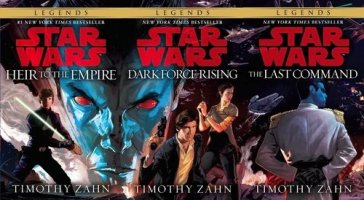
I wanted to read some "Star Wars Legends" lore (the now non-cannon fiction), but I also wanted to read more about Admiral Thrawn because reading an article about SW: Tie Fighter PC game I recalled he appears on it and always wondered "who was that blue-skin baddie". The Thrawn Trilogy looked like a good entry point, consisting on 3 comics drawn in the early nineties, and set a few years after the original Star Wars Trilogy and depicting the Admiral as the main antagonist.
Well, I don't know if it's just me having different expectations, or the way the story was written didn't appealed to as much as I was hoping for, but they felt... dull; very slow paced sometimes, other times over-complicated and a bit silly, the plot and its unrolling doesn't convinces me.
The drawing is nice (specially the main characters, really nice resemblance of the movie actors), the ships, the main arc by itself are all good, but the execution didn't attracted me. I sometimes read through omnibus collections in a few days, meanwhile here for around 400 comic pages took me a substantial effort.
Tags: Comic Book
Book review: Dark Imperium
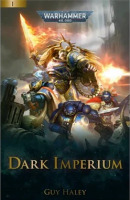
Dark Imperium is one of the first books based on the apparent new millennium (although not yet confirmed anywhere), where the Primaris Space Marines have already been created and are on their way to join (or should I say slowly replace?) their "classic" brothers, Roboute Guilliman is back and fighting chaos forces. While not the first primarch to return, it is the first loyal one to come. He feels a bit obsessed with his grim brother Mortarion, probably because of the attacks on Ultramar, but also seems to be quite impacted by what he's seen everywhere, from how the imperium survives to how the emperor "remains".
I didn't knew what to expect, if a quick sell of the Primaris and Death Guard miniatures range or new lore and maybe, just maybe, some tiny steps of the story moving forward in the 40k universe. And, while not incredible, it delivers. Hints to the emperor having lost any bit of humanity (if he had some actual care for people at all in the past), mentions on the maybe not so "legal" origins of the new space marines and Belisarius Crawl, surprise and disgust about the current state of affairs everywhere in the empire of man (will we see changes in the future?), even traces of disgust in Marneus Calgar's thoughts of his primarch's comeback. Plus of course some battles, just not anything incredible. I enjoyed more the intrigue fragments than the actual action segments.
An interesting read, I would check the synopsis before reading more books (in theory it's a trilogy) to confirm it's still appealing but not bad for "a new era".
Tags: Books Warhammer 40000
My latest discovery: Talespire
Lately I'm a bit bored of just playing games, I miss a bit doing something more creative. I also miss my miniatures. So when I learned about a new game, Talespire, that allowed you to setup and play "boardgame" scenarios as if you had real painted miniatures (with amazing graphics), I wanted to give it a try.
I learned about the game by a blog post, once it was already available at Steam (it's in Early Access), but researching for this post I found that it comes from a successful Kickstarter. Both sources are a good starting point, but check the Steam early access trailer to see why I fell in love with it:
You easily add tiles, walls, props (furniture, decoration) and entities (human-controllable miniatures, NPCs and monsters), save it (everything works online), and then can play, alone or with friends (no AI, though), in a turn-based fashion. It struck me both as how simple it appeared, and really is, you decide how far you want to go adding detail. But the visuals are incredible, it really looks as if you had real high-quality painted miniatures. The die roll realistically, music and sound effects help immerse, and special effects and "atmospheric controls" (time of day, weather, and other visual and lighting conditions) allow to create the perfect setting no matter if you are exploring dark sewers, a dungeon or a mountain on a sunny day.
I encourage anyone interested to read the terminology guide and the player's guide to properly understand what you can (and can't) do. For example, the combat system is as good as many normal computer RPGs, with 4 stats, combat resolution, initiative-based turns and other tweaks, but it is not Dungeons & Dragons. I find it a great balance between a not-totally-freeform game engine (like Vassal) and Baldur's Gate.
Oh, and remember what I mentioned before about the Kickstarter campaign? You should check it out as it hints of things to come later, like character editing (at minimum changing the colors), or a Cyberpunk/sci-fi setting which looks as amazing as the main medieval one (and exactly what I thought, "I'd love to have a Cyberpunk 2020 equivalent!").
This is an example screenshot I took exploring an amazing castle uphill I downloaded from the community:
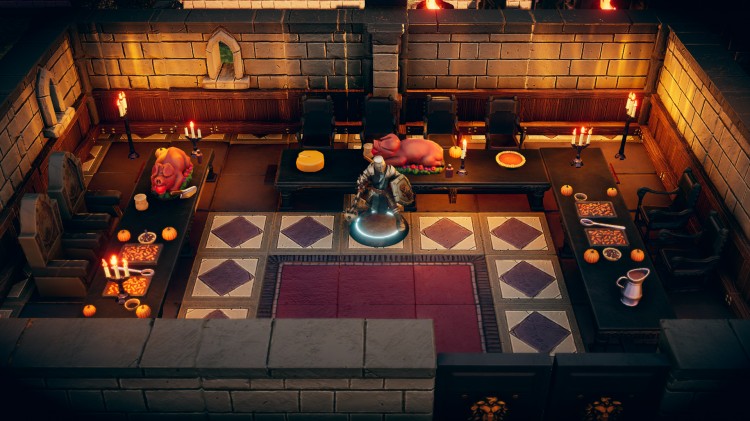
This was my first experiment, a small tavern made in a few minutes just after finishing the (in-game) tutorials:
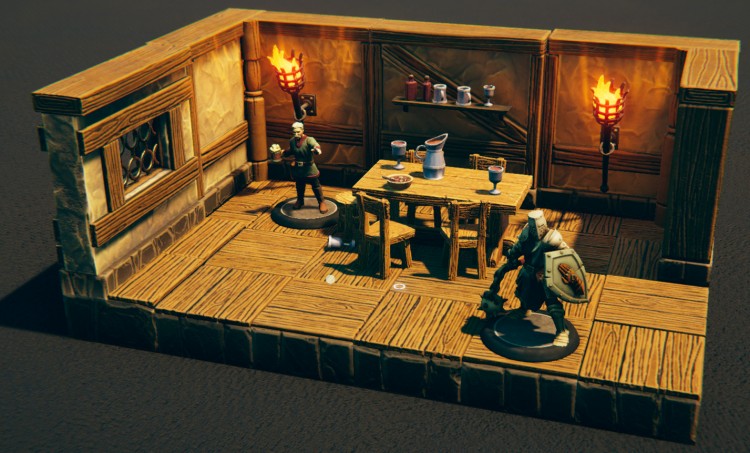
And my last screenshot is a work in progress of a bigger experiment, a HeroQuest board. Need to learn to play with tile sizes to see if I can keep corridors same size as the original, while having cool walls and room dispositions, but still I think end up quite similar:
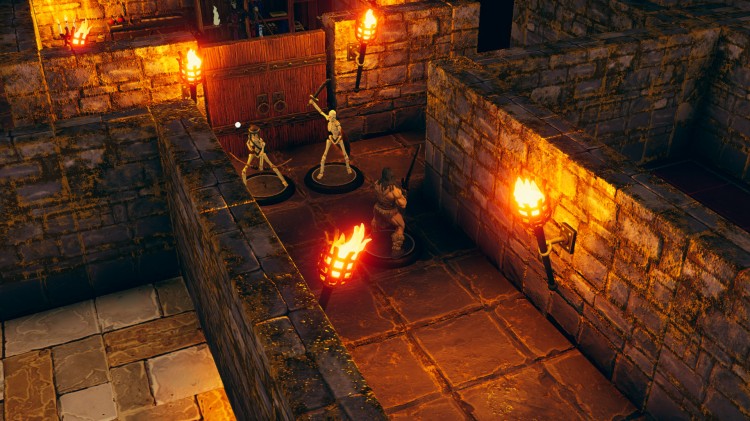
Of course the game is meant to be played with other people, but for now, to me it is a great way to relax assembling maps. I can pick any map from an adventure, or even cool randomly generated maps. Having your friends purchase the game to be able to play the campaigns can be a handicap, but the game is cheap, way less than any boardgame these days.
Before I finish, I wanted to also share a few great resources for inspiration and maps:
- Tales Tavern: Official website, acting both as a hub of player-created content, news, and tutorials (see next point)
- Tales Tavern Training Grounds: An official list of resources
- TaleSpire reddit: All things related with the game, from news to newest creations by people.
Tags: Boardgames RPG Tools Videogames
Comic Book review: Warhammer 40,000: Marneus Calgar
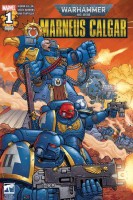
Marneus Calgar is a 5 issues comic in which we get to know the origins of this Ultramarines chapter master. Meanwhile directing a battle against chaos forces, Marneus explains his youth and how he got chosen to became a Space Marine to an Adeptus Mechanicus ally, combining flashbacks with "present action".
The quality of the drawings is excellent, with no problems on depicting some gory scenes. As for the story, on one side the origins are quite interesting, I won't spoil the surprise but it is quite unexpected what we learn, specially for the Ultramarines chapter begin so based on laws, code and rules. On the other side, the situation becomes quite absurd, a too talkative chapter master telling a story to an adept which sometimes seems to be more interested in the actual war than Marneus itself. It feels almost absurd that he would go and tell a very profound secret to a random unknown ally, even more so during a battle, no matter how incredible he is calculating strategies to defeat the enemy.
I applaud the desire to create genuinely new content (even if coming from known characters), and a really grim and dark tone more akin to the Warhammer 40,000 setting, but the scenario and way to tell it feels too much forced. That said, it is interesting and seems that Games Workshop is really trying to push the lore component forward and make it way more complex than until now.
Tags: Comic Book Warhammer 40000
Warhammer 40,000 Rhino APC inspiration
It is common to use real world vehicles as inspiration for creating new fictional ones, even in science-fiction settings, such as Warhammer 40,000. While Games Workshop today probably tries to build all models mostly from scratch (just based on their previous designs, so there's the sense of evolution and familiarity), on the early days it seems they used real world tanks.
First, let's take a look at the M113 APC (Armoured PErsonnel Carrier), a tank born in 1962 but still in use at least until 2019!
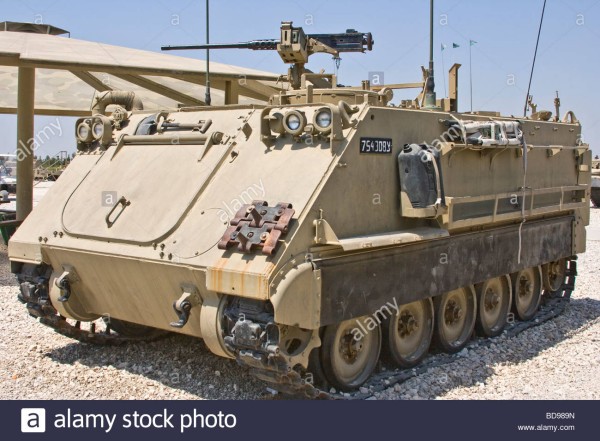
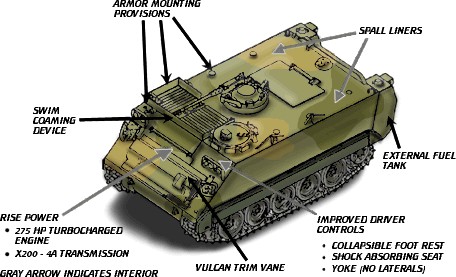

Now let's compare it with Warhammer 40,000 Rhino APC MK.I and MK.II models:
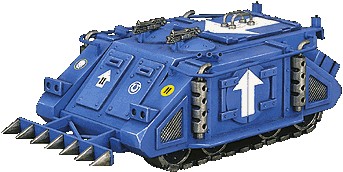
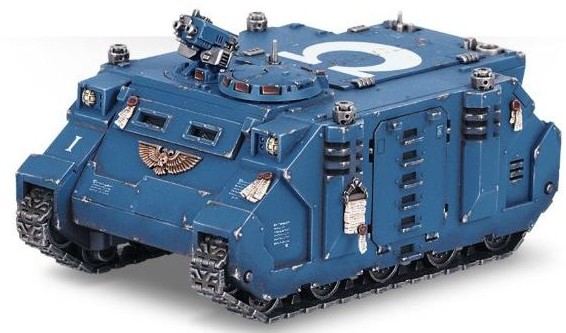
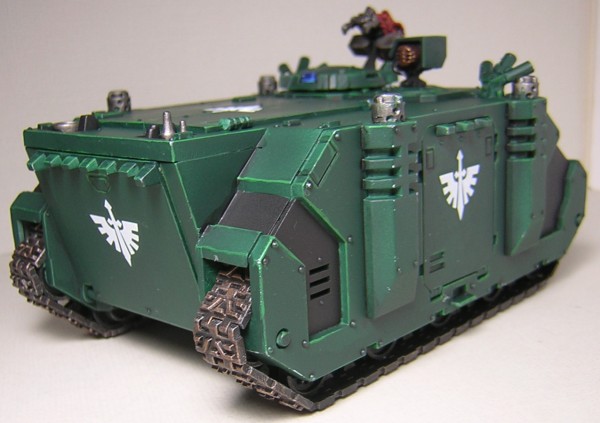
As you can easily see, it's not only that the general armoured vehicle form is the same, it's that the threads are almost exactly the same (actually in the old MK.I model they are), in MK.II they changed them to that eagle-like design), the lights are pretty similar, and even the upper turret dispositions and back door is equal.
There are of course some changes, like side doors and exhaust pipes, and the side design has a more triangular shape compared with a parallelogram shape of the M113A.
The Rhino MK.II model became a bit more different with its changes to appear more sturdy, more reinforced than the original Rhino, but still the influence is there.
And really there's not much else, I just found a real tank photo and thought it would be worth to document the visual comparison. If I have time I'll research from which real life models the Leman Russ and Land Raider tanks come, as I believe both have military counterparts.
Tags: Warhammer 40000